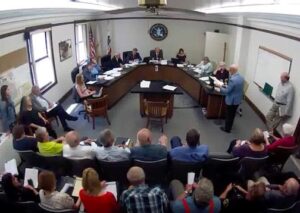 June 9, 2019 – A 45-day emergency moratorium on hemp cultivation failed to carry by a narrow vote at a meeting of the in Plumas County Board of Supervisors on June 4. Cal NORML was contacted by members in the county and sent a letter to Supervisors asking them not to pass the moratorium. We also alerted supporters in the area about the meeting.
June 9, 2019 – A 45-day emergency moratorium on hemp cultivation failed to carry by a narrow vote at a meeting of the in Plumas County Board of Supervisors on June 4. Cal NORML was contacted by members in the county and sent a letter to Supervisors asking them not to pass the moratorium. We also alerted supporters in the area about the meeting.
Plumas County residents voted 52% in favor of Prop. 64 to legalize marijuana in California, but the county has banned all commercial marijuana business in their borders. Measure B, a voter measure to tax and regulate cannabis businesses in Plumas, failed to pass in November 2018.
The county had similarly failed to pass a hemp moratorium last year, but this year the sheriff brought a slide show depicting code violations at one hemp farm. He and officials asked for the moratorium to consider options, pointing out that AUMA (Prop. 64) was written for “traditional” hemp crops (grown for fiber or seed) rather than addressing the “gold rush” of CBD, for which hemp is grown in the same manner as marijuana.
Local business representatives and their attorneys spoke at the meeting, saying they had invested millions ventures currently cultivating thousands of hemp plants. Marin-based attorney George Bianchini threatened to sue the county if it passed the measure, on the grounds that an “urgency” ordinance can only be declared for proper reasons. He and several other speakers challenged the ordinance’s proclamation that no other solution other than a moratorium was possible.
State law, starting with Prop. 64 in 2016 and SB 1409 (Wilk) last year, established regulations for cultivating industrial hemp, as has the California Department of Food and Agriculture, which has issued an application for registration that farmers can take to their local Ag Commissioners.
Under state law, those growing hemp in conjunction with an “established agricultural research institution” are exempt from the registration requirement. A professor from the University of Nevada at Reno, who is involved in one of the research projects, offered to test plants for the sheriff to determine whether their THC content qualifies them as hemp.
The 2018 US Farm Bill descheduled hemp from the federal Controlled Substances Act and opened the door for state regulation of industrial hemp cultivation. In order to conform with the new federal law, another bill by Sen. Wilk is before the state legislature this year, and CDFA is fast-tracking emergency regulations.
Attorney Patrick Goggin stressed in his testimony that UDSA had just issued a memorandum saying that 2014 rules were in effect, and noting that the state will have emergency regulations in place on June 11. A moratorium passed this year is effectively a ban, he stressed. Indeed many of the speakers said they had prepared their land and seeded their crops for the year.
One local said at the hearing that she bought hay from the Roberti Ranch and couldn’t tell they were growing hemp on the property when she did business with them. Another rancher down the road from a hemp farm testified that she was dubious when they moved in; after meeting them she now wants to grow some herself. Another local pointed out that, “Right now America gets 50% of its hemp from China.”
One Plumas resident spoke about a lack of alternative crops for local farmers. Alfalfa, for instance, doesn’t withstand frost, and in any case the price for alfalfa and cattle seem to be dropping. Another rancher said he hadn’t had steady work since timber industry went away in the county.
Rancher Roberti of Roberti Ranch turned to the locals and said, “Cannabis people, we don’t want you here.” Much was made of distinguishing hemp from marijuana, although it was stated (correctly) that both are cannabis.
Supervisor Lori Simpson, who said she’d voted against the moratorium last year, clarified with the sheriff that there was only one marijuana grower who falsely claimed to be growing hemp in Plumas last year. She also clarified that Measure B did not include hemp. She asked why the moratorium wasn’t brought in December 2018 after the feds descheduled.
Supervisor Sharon Thrall, who said she was for industrial hemp, spoke in favor of the moratorium because the sheriff doesn’t have functional regulations. The state regs will have to be approved by the feds, she pointed out, and who knows how long that will be. Noting that 45% 0f counties have a hemp cultivation moratorium, she said she doesn’t want more people to start growing only to find out there will ultimately be a moratorium or ban. She suggested doing as Stanislaus county has by enacting a one-year pilot program.
Supervisor Engel suggested waiting a week to do more investigating, but Supervisor Sanchez, who was running the meeting, pushed for a vote. It came down 3 in favor with two against (Simpson and Goss). Since the urgency measure needed a supermajority to pass, it failed. The vote fell along the same lines as last years’ vote.
Also see: FDA Holds Hearing on CBD as CA Moves Forward on Hemp
 Is this information valuable to you? Please support our efforts by joining Cal NORML today. Also learn about our Business Memberships.
Is this information valuable to you? Please support our efforts by joining Cal NORML today. Also learn about our Business Memberships.
Read about Cal NORML’s mission, accomplishments and plans.
